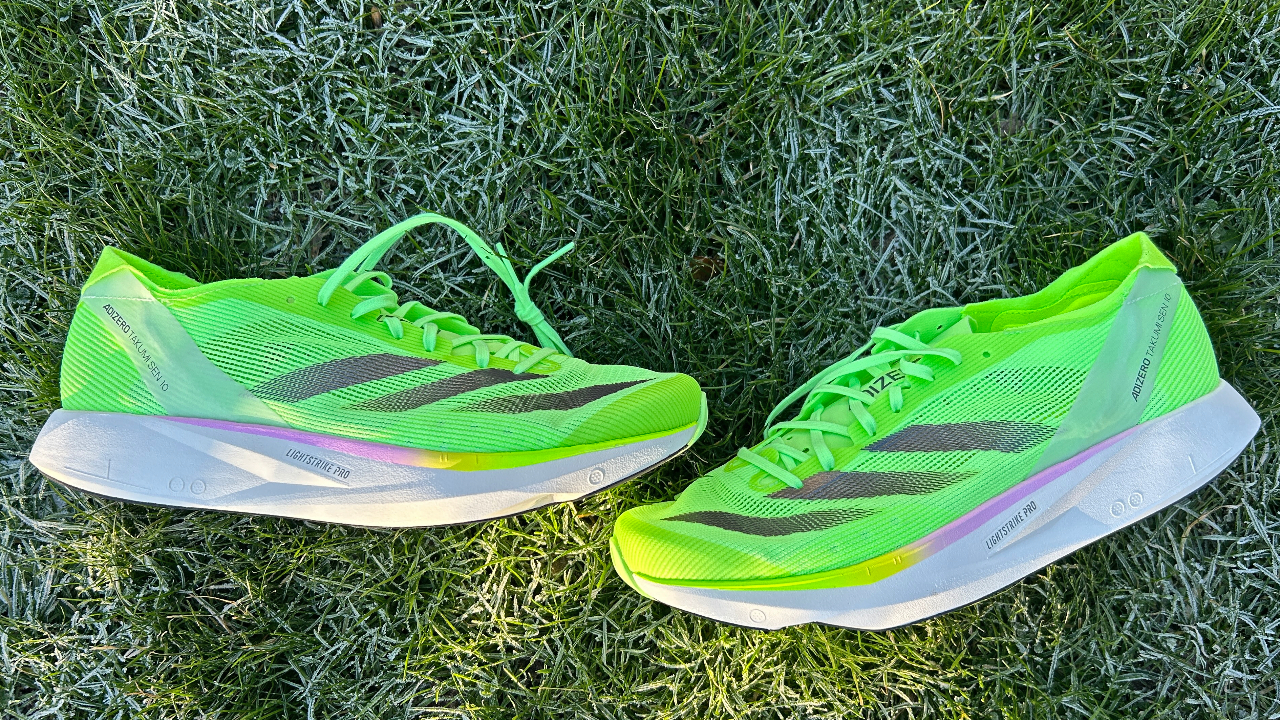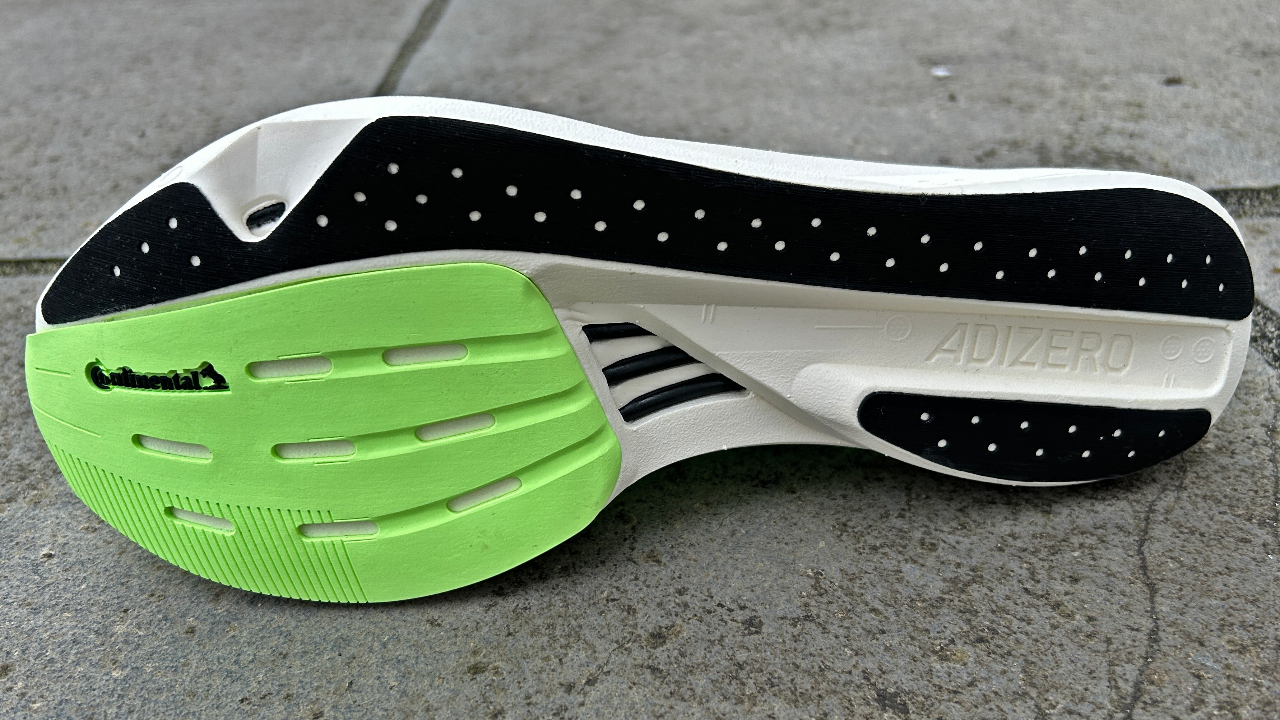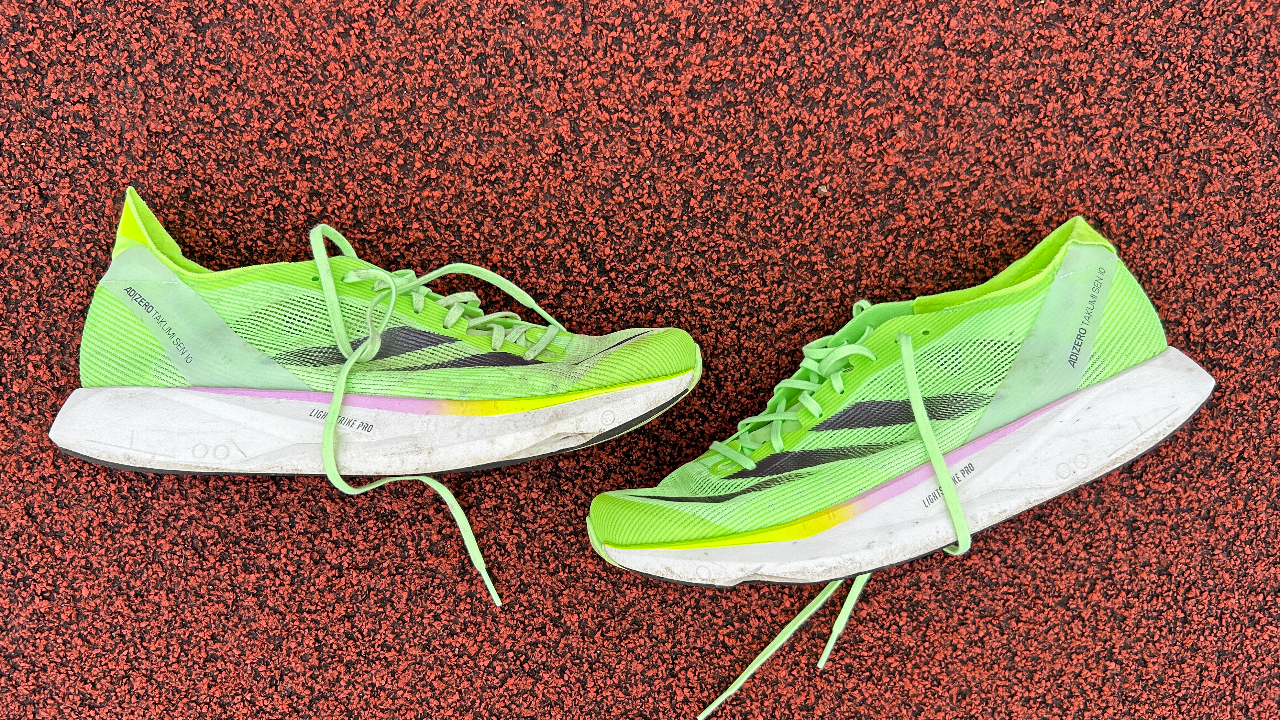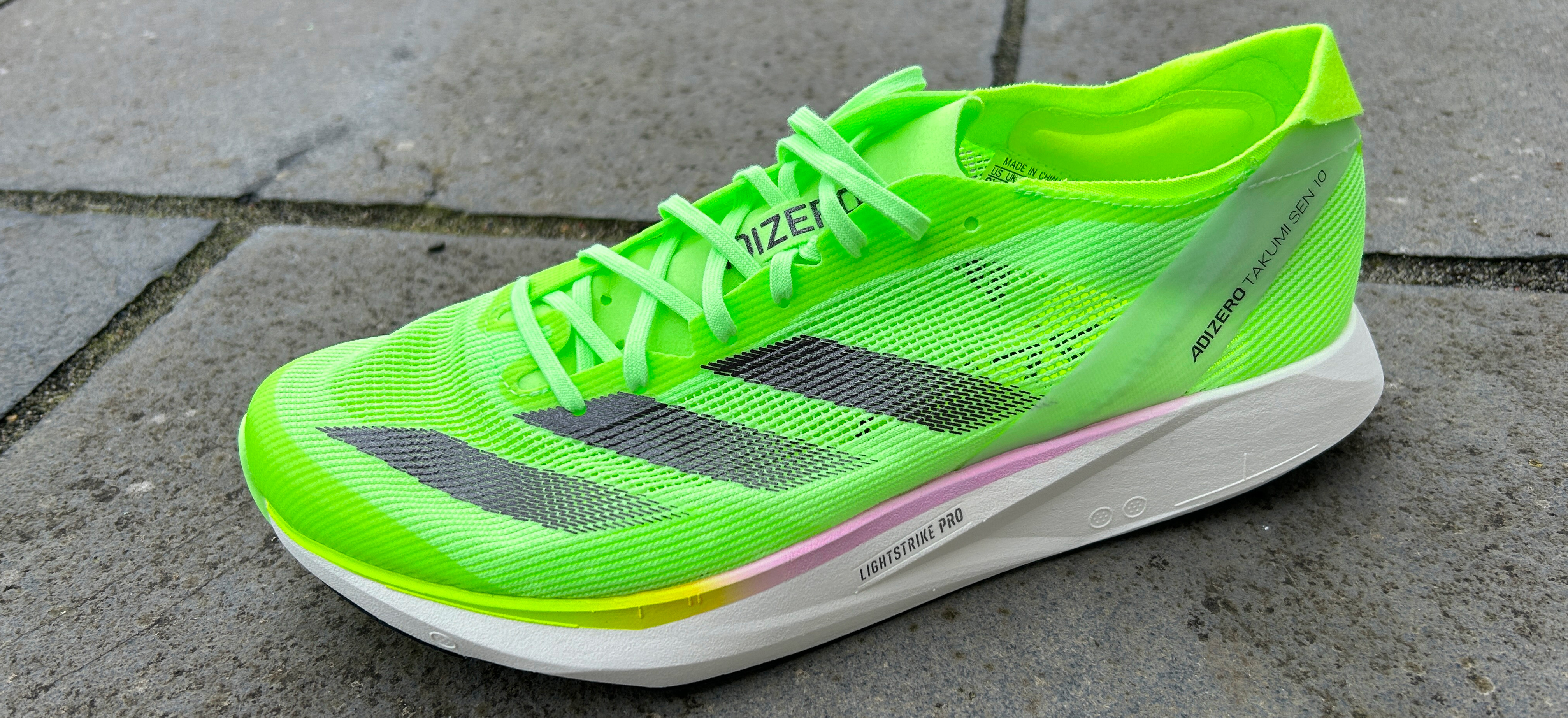Our Verdict
The Adidas Adizero Takumi Sen 10 is a brilliant lightweight racing shoe designed for short-distance events. Compared to the best carbon plate running shoes it lacks some punch—it has a lower stack than most super-shoes—but it’s more stable, and excels when running fast on courses with lots of turns.
For
- Lightweight, nimble design
- Fast over short distances
- Good outsole
Against
- Almost as expensive as carbon shoes
- Not as propulsive as the best racers
You can trust Coach
The Adidas Adizero Takumi Sen 10 isn’t a typical modern racing shoe. Instead of having a stack height that hits the 40mm limit set by World Athletics and a full carbon plate, it’s a nimble shoe with a relatively low stack and uses glass fiber rods rather than a carbon plate to provide added pop on the run.
As a result, the Takumi Sen 10 can’t match the propulsive feeling of the best carbon plate running shoes. I wouldn’t fancy using it for a marathon, but its lightweight and agile design makes the shoe a fantastic racing option for shorter events, especially on twisty courses.
Adidas Adizero Takumi Sen 10: Price And Availability
The Adidas Takumi Sen 10 launched in January 2024 and costs $180 in the US and £170 in the UK. That’s the same price as the previous two generations of the shoe and cheaper than top super-shoes like the Nike Vaporfly, which usually costs more than $200/£200. I got my sample for this review from SportsShoes.
How I Tested This Shoe

I’ve run 30 miles in the Takumi Sen 10, using it for three training runs, including two hard workouts and a five-mile race where I set my PR of 26min 6sec. I used the Takumi Sen 8 extensively, running more than 120 miles in the shoe including racing at 5K, 10K and half marathon distances, and have also tested most of the best carbon plate running shoes and Adidas shoes including the Adidas Adizero Adios Pro 3 and Prime X 2 Strung.
Design And Fit
Adidas didn’t alter much about the Takumi Sen between the eighth and ninth generations of the shoe and, while the midsole set-up has been changed with the Takumi Sen 10, it still has a similar look and feel to its immediate predecessors.
The stack height is still 33mm at the heel and 27mm at the forefoot for a 6mm drop, which is notably lower than most current super-shoes, which hit 40mm at the heel as standard. The Takumi Sen 10 also has a narrow design and feels more like a souped-up racing flat than a trimmed-down super-shoe.
There are two layers of Adidas’s Lightstrike Pro foam in the midsole that surround glass fiber rods. The EnergyRods 2.0 system in the Takumi Sen 10 extends the rods to the back of the shoe in one continuous piece, whereas the Takumi Sen 8 and 9 had rods under the forefoot and a small carbon plate under the heel.
This design means the Takumi Sen 10 weighs more than the previous two versions of the shoe. The 10 weighs 7.3oz/206g in my UK size 9, whereas the Takumi Sen 8 weighed 6.8oz/184g. The Takumi Sen 10 is still light compared with most super-shoes, although the Nike Vaporfly 3 is the same weight despite its 40mm stack.

The Takumi Sen 10 has a lightweight mesh upper with minimal padding on the tongue and collar of the shoe. The tongue annoyed me because it was hard to get it into the right position when lacing the shoe, though it didn’t affect my running experience. I found the shoe fitted well in my usual running shoe size, but it does have a racing-focused fit, in that it’s narrow and tight around the toes. This works well for me because I have a narrow foot, but if you have a wide foot it may be cramped in the toe box.
There are cut-outs in the midsole foam to reduce the shoe’s weight, but the Takumi Sen 10 retains good outsole coverage. The Continental rubber used is durable and delivers great traction on wet roads. It also gripped well on a greasy track during my testing.
Running Performance
I loved the Takumi Sen 8 and used it for a lot of training and races, even though higher-stack carbon shoes delivered more propulsion. This was because, at times, the trade-off of that bouncier midsole for the agile, light design of the Takumi Sen 8 was worth it—especially when doing short reps in training or racing on courses with lots of twists and turns.
The same is true of the Takumi Sen 10, which still doesn’t match the spring of a full super-shoe like the Vaporfly, but is still fast, and is ideal for certain conditions. It’s just a lot of fun to run fast in such a light and narrow shoe, and a welcome change from the bigger feel of most modern racers. The changes in the midsole have made the Takumi Sen 10 firmer than the Sen 8, and I think you get a little more spring from the new EnergyRods 2.0, but I found the overall feel of the two shoes was similar.
I used the Takumi Sen 10 for a five-mile race in Victoria Park, London, on a mostly flat and fast course and it didn’t disappoint. I ran a PR for the distance of 26min 6sec and the shoe felt great, with the lightweight design helping me to turn my feet over and keep the pace up as I tired late in the race.

On that kind of course, however, with mostly sweeping turns and lots of flat straights, I’d still probably lean towards using a higher-stack shoe for the extra bounce. There are lots of courses where the Takumi Sen 10 has the edge, though, and for training runs I found it helpful to have a lighter shoe that took turns easily.
I did a progression 10K run in the shoe, moving from 3min 45sec/km pace to 3min 13sec/km pace on the streets around me. There were many moments during the run where I felt the benefit of the more agile design, such as when running on cambered paved surfaces, dodging other people and slipping through barriers.
The Takumi Sen 10 also felt brilliant when doing shorter reps at the track. I used it for a set of 10 400m reps straight after using the Puma Fast-R 2 for 10 1K reps, which showcased the different benefits of the shoes. The Fast-R 2 is considerably heavier but packed more of a punch and was great for helping me to cruise through the longer reps at speed, while the Takumi had the raw pace and lighter feel for the shorter reps.
Is The Adidas Adizero Takumi Sen 10 Worth It?
The Takumi Sen 10 is a brilliant shoe, and one I love, but it’s still a tough one to recommend because it doesn’t fit that well into a traditional running shoe rotation. For that I’d have a cushioned shoe, a versatile daily trainer that can handle some speed, and then one of the best carbon plate running shoes for races.
The Takumi doesn’t fit any of those categories perfectly, unless you only do short races. However, it would be the fourth shoe I’d add to my rotation because it’s such a fantastic and fun option for fast training sessions and certain races. I found it a practical shoe for speed sessions on the roads near me, where it’s not easy to find flawless, flat asphalt with few obstructions.
At its full price it’s hard to say it’s worth picking up the Takumi Sen 10 for this purpose, when the Nike Vaporfly 3 is just as light and even better for most short races, then more propulsive for longer ones. However, the Takumi Sen line is often reduced, and I’d not hesitate to recommend the shoe if it drops nearer $120/£100, which has happened on many occasions with the Takumi Sen 8 and 9.
You could also look to grab one of the older Takumi Sen models in the sale now the 10 has been launched because I found the new shoe similar to the Takumi Sen 8, despite the updated midsole.

Nick Harris-Fry is a journalist who has been covering health and fitness since 2015. Nick is an avid runner, covering 70-110km a week, which gives him ample opportunity to test a wide range of running shoes and running gear. He is also the chief tester for fitness trackers and running watches, treadmills and exercise bikes, and workout headphones.

